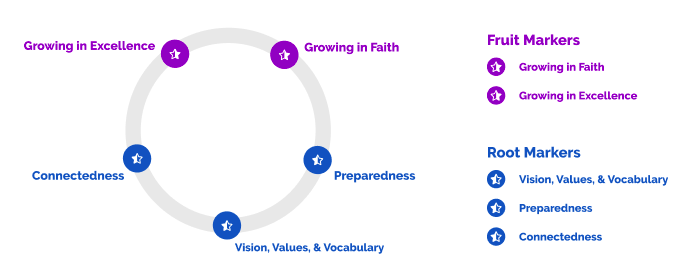Thriving Volunteer Culture: The Five LeadUp Health Markers Explained
Today, I want to talk to you about the LeadUp Framework and the five markers in the LeadUp Framework that help you to define what we consider a healthy or thriving volunteer ministry team.
I’m Scott, the founder of ServeHQ and this is the framework I’ve developed after four years of conversations with thousands of ministry leaders and 15 years of my own ministry experience leading volunteer teams.
If you’d rather watch or listen to learn, jump to the bottom of the post for the YouTube video.
So those five markers are five areas of health in your volunteer ministry team and they’re broken down into two different types of markers. There are two fruit markers and three root markers.

We’re going to start by talking about the root markers because the root markers are the work that you do under the soil that you are constantly working on that are the things that pull in the nutrients, pull in the value, pull in the health, that then give the opportunity for the fruit in your ministry to be seen.
Root Marker #1: The “3-Vs”
There are two fruit markers. The fruit markers still take work, they still take cultivation and nurturing, but they are typically the outpouring of the work that you put into the root markers. The first root marker is a clear and adopted “3-Vs”. The “3-Vs” are vision, values and vocabulary.
Your team needs really clear vision for what you’re trying to accomplish with your ministry. You need really clear values and things that you care about, the things that are non-negotiables in your ministry and are really unique to your ministry, not just a copying of the churches values, but what you specifically care about in your ministry.
And those values will be different from other ministries in your church. And then vocabulary. So it’s really important that your team has a specific vocabulary that you all use, that you all share and is unique to your team.
A shared vocabulary helps to create a bond of cohesion. It helps to communicate the vision, helps to communicate the values. The vocabulary is what brings the vision and the values into some concreteness in your team. The first marker is vision, values and vocabulary or the “3-Vs”.
Root Marker #2: Preparedness
The second root marker is preparedness because your team needs to be prepared to volunteer. They need to be prepared to serve. And that looks like a few different things. That looks like good onboarding training.
It helps to make sure that new volunteers are prepared to join your team. There’s a whole big category of things that should be happening in onboarding when a new volunteer joins your team.
Then there’s ongoing training. Helping your team go from good to great with ongoing training for skills that are specific to their role. Then there’s preparedness that’s not training related, but it’s preparedness of the heart. We prepare through prayer and we prepare through expectations.
We pray that God would move, we pray that God would use us in our ministry. We prepare regularly that way. Then we also prepare through having an expectation that God would do what we’re asking for through prayer. So that’s preparedness. That’s number two.
Root Marker #3: Connectedness
The third root marker is connectedness. It’s a very well known fact that people will leave your team for all sorts of reasons, but if they are connected to one another on the team and they have friendships on that team, that that team becomes very sticky. And so we often suggest that you start with connectedness on your team.
If you’re looking at these five markers and you’re like, “Man, this is a lot of work. We don’t know where to start.” We often say that you should start with connectedness because connectedness really forms the bond for all the other things to start falling into place.
Connectedness is how people on the team connect with one another on the team. Whether that’s on Sunday mornings or that’s throughout the week having coffee or if that’s creating spaces online for your team to connect and to chat and to build friendships there.
Also the way that your team is structured to make sure that your people are serving with one another consistently instead of having to make new friends and serving with different people each week. Those are the three root markers.
Fruit Marker #1: Excellence
Then there’s two fruit markers and they’re both ongoing process markers. One is growing in excellence. We expect that your team should not just be a good team to be on, but that you’re actually accomplishing your vision and accomplishing what you’re trying to do.
Whether that’s discipling kids or being clear about the gospel, or helping visitors to feel welcome, or pulling off really highly engaging Sunday worship services, if you’re usher team, making sure that the room on Sunday morning is calm and organized and people can pay attention on Sunday mornings.
Whatever your mission for your ministry team is, your team should be growing in excellence. That means that your individuals are growing better at their job or their job role, as well as the whole team is working together to grow in excellence.
There’s some specific things you can do to help grow in excellence as a fruit of your ministry.
Fruit Marker #2: Faith
Then the other fruit marker is growing in faith. I believe strongly and you probably believe strongly too, that if you are a volunteer in a team, that your experience on the team should grow your faith. It should be a discipling experience and not just a pouring out experience, but they should be poured into.
A big part of that is understanding vision, values and vocabulary so they understand the language of what we care about. Making sure that the things that we care about are related to growing in your faith.
But also in how you lead your team, there’s some specific systems we can help you with. We’re going to be teaching in future videos that will help you lead your team in a discipling environment where it’s not just about showing up to serve, but you’re also pouring into them to help them to become well-made disciples of Christ.
Those are the five pieces, the “3-Vs” which is vision, values and vocabulary. Number two is preparedness, number three is connectedness, number four is growing in excellence and number five is growing in faith.
These are the five markers we’re going to be talking about a lot over the next six months. I’m going to be fleshing out all the different pieces, all the different expressions of those markers and then I’m going to be giving you systems and resources where you can put those expressions into action.
Train church volunteers and disciples online, easy.
Use our simple on-demand video training courses to equip volunteers, develop leaders, and teach disciples. Create your own training or use our video library. Our training automation platform makes it simple and fast to get your people ready for ministry.
Other Posts You May Like
All Growth Begins with Self-Awareness
My first year on the YouVersion Bible App team was exciting and challenging. I joined the team to help with partnerships and community-building. Like any new job, the first year came with a learning curve and the need to pick up new skills. I had never been part of a technology team before, so I…
Is Your Leadership Style Helping or Hurting You?
Your leadership style — how you make decisions, connect with and influence others, delegate, handle conflict, cast vision — is shaped by many factors. Your family history and work experience, along with your personality and internal wiring, impact how you think about and “do” leadership today. Leaders we have worked with, for better or worse,…
A Church Is Only As Healthy As Its Team
When you joined the team at your church, what kind of training did you get in the first weeks? Did you have an HR meeting to cover the health insurance and retirement accounts? Did you cover how to submit an expense report or reserve a room on the master calendar? How about how to handle…



